16+ SAMPLE Lawn Care Agreement
-
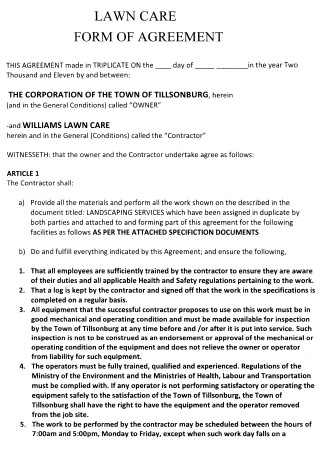
Lawn Care Form of Agreement
download now -
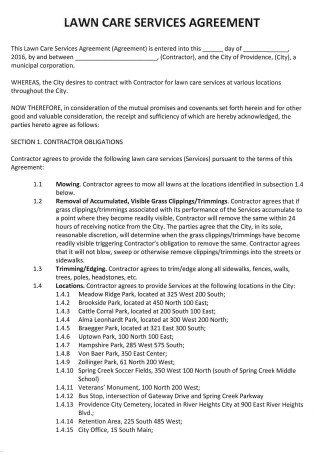
Lawn Care Service Agreement
download now -
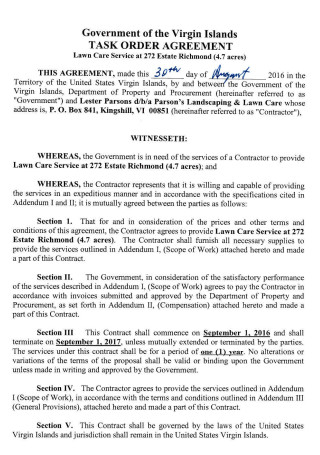
Lawn Care Task Order Agreement
download now -
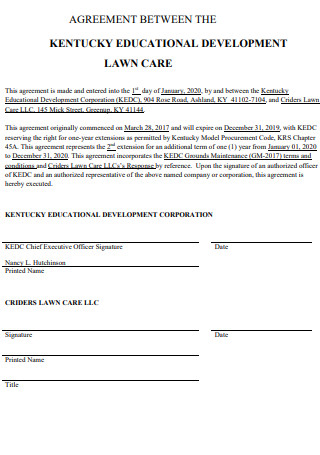
Lawn Care Development Agreement
download now -
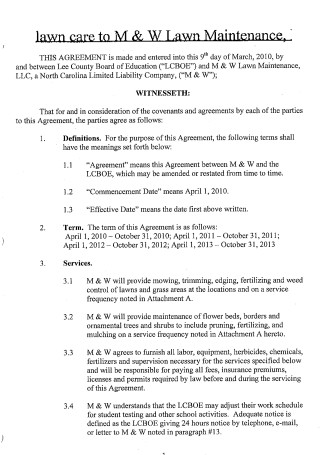
Lawn Care Maintenance Agreement
download now -
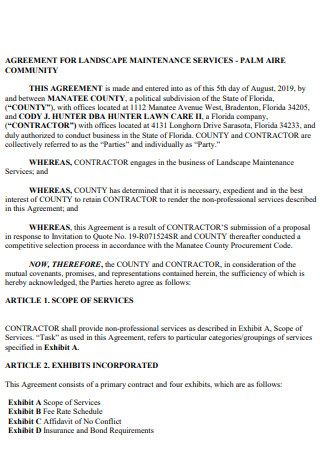
Lawn Care Contractor Agreement
download now -
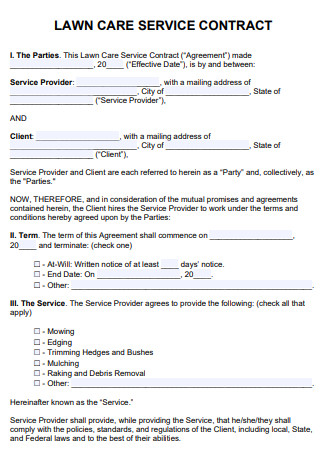
Lawn Care Service Contract Agreement
download now -
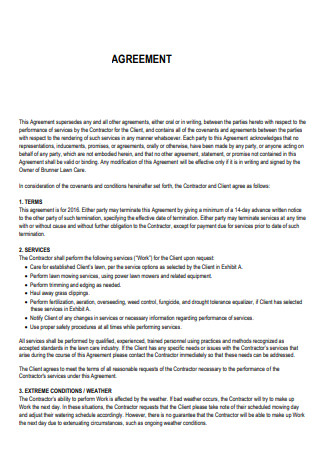
Sample Lawn Care Agreement
download now -
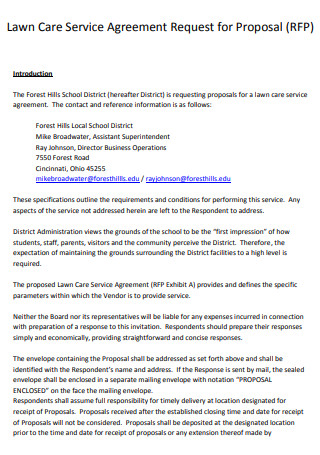
Lawn Care Agreement Request for Proposal
download now -
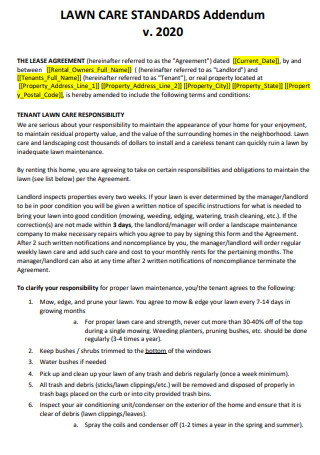
Lawn Care Lease Agreement
download now -
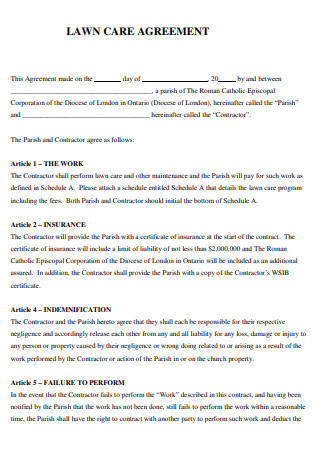
Lawn Care Agreement
download now -
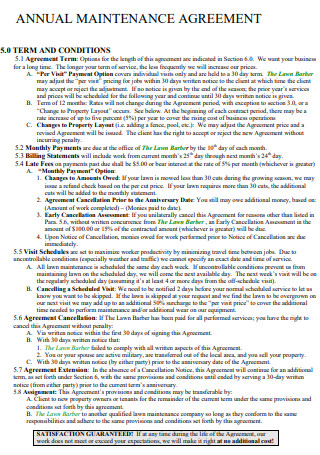
Lawn Care Annual Maintenance Agreement
download now -
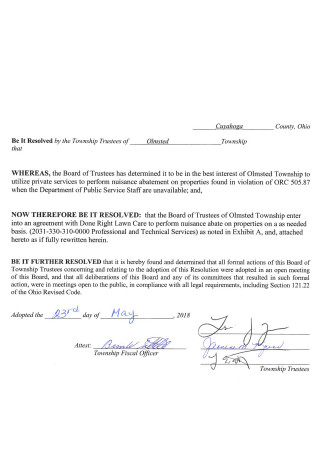
Lawn Care Agreement Example
download now -
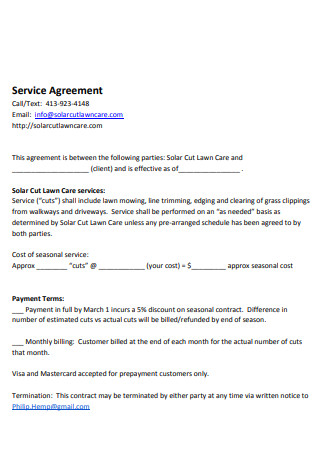
Blank Lawn Care Agreement
download now -
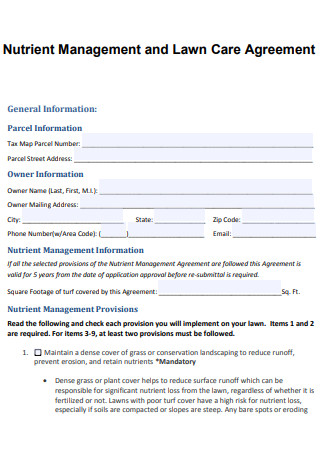
Nutrient Management and Lawn Care Agreement
download now -
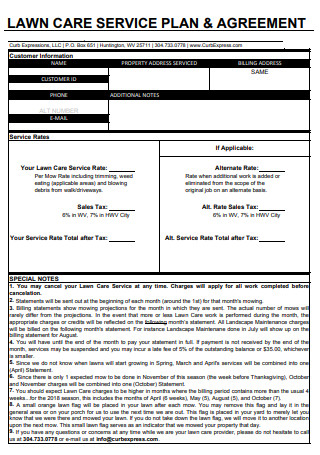
Lawn Care Service Plan and Agreement
download now -
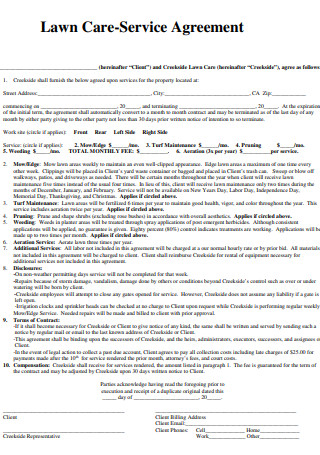
Lawn Care Agreement Template
download now
FREE Lawn Care Agreement s to Download
16+ SAMPLE Lawn Care Agreement
What Is a Landscaper?
What Is a Lawn Care Agreement?
Types of Property
Different Essential Lawn Tools
How to Write a Lawn Care Agreement
FAQs
What is a landscaping contract?
Why is lawn care important?
What are the advantages of hiring a professional lawn care service?
What Is a Landscaper?
A landscaper is a person hired to look after a lawn or garden in exchange for a fee. The major goal is to create an attractive look and feel that complements the surrounding scenery. A Landscaper is expected to labor when and where their client specifies. Mowing lawns, applying fertilizer, spraying insecticides, eradicating weeds, trimming bushes, raking leaves, and other tasks are among the responsibilities. They can also continuously be of service for an additional price.
What Is a Lawn Care Agreement?
In exchange for payment, a client might enter into a lawn care contract with a landscaper for commercial or residential services. Lawn mowing, hedging, clipping, and any other maintenance requirements from the client are common services provided by the landscaper. The services are frequently planned, particularly for business clients, and the client pays a recurrent weekly or monthly Fee. A tenant lawn care agreement is prepared to employ their services. But it could be challenging to set the content if you are unfamiliar. You can proceed to view the lawn care agreement sample for additional references.
Types of Property
Merriam Webster Dictionary defines property as something that owned or possessed a section of real estate in particular. As they have sole possession of something, they have the exclusive right to occupy, enjoy, and discard it. Another definition is that a person or company has a legal title over. There are various types of it that may or may not have a yard involved. Regardless, you should be knowledgeable of the differences.
Different Essential Lawn Tools
Throughout the season, regular maintenance and attention are required for healthy grass. It necessitates continual attention and reacts well to various lawn treatment methods. Watering the grass, especially in the heat, revitalizes the brown lawn. When you aerate the soil, enable the roots to breathe, and guarantee correct drainage, grass grows well. Investing in a well-kept lawn will increase the value of your home. Investing in these several sorts of lawn tools will repay you with a lush, healthy yard. Having a great lawn is necessary, whether it’s to increase the value of your Home or simply as a hobby.
How to Write a Lawn Care Agreement
Now that you have reached this part of the article, it implies you have sufficiently read through the curated lists found above that have supplemented your knowledge required to write the lawn care Agreement. Although there is no standard lawn care agreement form, there are still components necessary to include in the document itself. This guide will show you the basic lawn care agreement that you should include in the document.
-
1. Professional Information
To start off the lawn care agreement, you should state the names of the client or the property owner involved in entering into the agreement followed by the name of the business or company offering the services, which is you. Next would be the location of the property where the work will be done and performed, the date the agreement is written or delivered, as well as the contact information such as phone numbers, emails, and other relevant information to be mentioned. Additionally, you can include the respective logos and taglines of your business and the client’s business, if applicable.
-
2. Give a Detailed List of Services
Despite the client being aware of the usually known type of services you are providing, you should still define and clarify each and every service you are willing to provide for your client. It isn’t right that the client would immediately assume what you are doing for them. And the worst case is they would tell you to do something that is beyond your capabilities. To get greater clarification, highlight any clauses or sentences that are confusing. In the event of damage, the agreement should specify who will be liable for replacing Equipment such as fencing or irrigation systems.
-
3. Payment Terms
Traditionally, payment terms have been 30 days from the date the agreement was issued and signed. Standard payment terms in an industry like construction, for example, are more likely to be 60 or 90 days from the invoice date. Many companies are still not paid on time, even with 30-day terms. It is important that you discuss this thoroughly with your client.
-
4. Signature Box
To be legally binding, both parties must be aware that they are engaging in a contract. A contract requires active participation from both parties. They must be aware of the contract’s existence and willing to be bound by its terms. If the appropriate acknowledgment is not established, contracts may be nullified. The contract will be nullified if one of the parties signed an agreement under duress or can prove undue influence, fraud, or deception. It is critical for all parties entering into a contract to prove that the agreement is genuine, mutual and that all parties assent to its contents in a clear and definitive manner.
FAQs
What is a landscaping contract?
A Landscaping Contract is a legal agreement between a landscaping company and a customer. Payment terms, party contact information, landscaping services, and how to handle legal problems are all spelled out in the contract. A landscaping contract becomes legally enforceable and mutually agreed upon when both parties sign it. You must draft a contract in line with your state’s laws and the scope of the job when a landscaping contractor offers services to a property owner. It is common practice to require customers to sign a landscaping contract.
Why is lawn care important?
Lawn care guarantees that your lawn can survive challenges from weeds and insects that can harm it. It also ensures that your flowers, grass, and shrubs are disease-resistant. Furthermore, lawn maintenance ensures that your yard can withstand inclement weather and that your lawn is always nutrient-rich. Maintenance contracts come into play when employing the services of professionals if you are interested to have your lawn be cared for.
What are the advantages of hiring a professional lawn care service?
The first impulse when it comes to Lawn Care is to avoid hiring anyone to save money. However, there are drawbacks to that decision. The top five advantages of hiring a professional lawn care company. The major objective for hiring them is to minimize inadvertent information; yet, their abilities will be crucial in the long run. Second, you can keep the labor stress to a minimum. They can also expand their services to include regular and additional grass maintenance. Finally, as is well known, it increases the value of your home.
Securing a service agreement for lawn care may be tricky if the client does not know who to approach or if you are new to the industry and have no loyal customers who would contact you, and furthermore, you may be stressed over the format. This is why this article is helping you out to provide you with templates on lawn care maintenance agreements. Don’t dally around and begin writing now!
